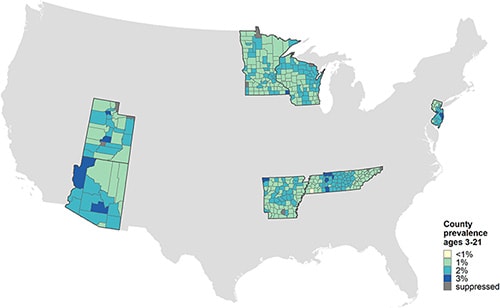Autism Research and Resources from CDC
April is Autism Acceptance Month. The recognition raises awareness about autism acceptance and promotes inclusion and connectedness for people with autism. Social and community support can help people with autism achieve optimal health and reach their full potential. CDC promotes early identification and provides essential data on autism to inform programs and policies that support children with autism and their families. CDC activities include surveillance and monitoring, educational materials and resources, and sharing best practices with state, territorial, and national partners.
Key Findings provide brief summaries of some of our latest autism research.
CDC activities help us understand and help children and families with autism.
Autism and Developmental Disabilities Monitoring (ADDM) Network
The Autism and Developmental Disabilities Monitoring (ADDM) Network is the only collaborative network to track the number and characteristics of children with autism spectrum disorder (ASD) and other developmental disabilities in multiple communities throughout the United States. The ADDM Network has been tracking the number and characteristics of 8-year-old children with ASD since 2000. The program is now in its sixth phase of funding, and the ADDM Network includes ten funded sites and one CDC-managed site in Georgia.
The sixth funding cycle and surveillance activities of the ADDM Network began in January 2023 with new and returning sites. The 11 ADDM Network sites will track early identification, prevalence, and characteristics of children with ASD among 4- and 8-year-olds. Five of the sites will also track transition planning and co-occurring conditions among 16-year-old children with ASD.
Learn more about CDC’s ADDM Network.
Study to Explore Early Development (SEED)
CDC’s Study to Explore Early Development (SEED) launched in 2007 to help us learn more about autism in preschool-aged children. SEED is one of the largest studies of young children, ages 2-5 years, with ASD in the United States. It looks at their risk factors for ASD, developmental characteristics, and health and healthcare needs.
The information collected through SEED enables researchers to study potential risk factors for ASD and other developmental disabilities. SEED continues to explore the many possible risk factors for autism, including genetic, environmental, pregnancy, and behavioral factors. In 2021, SEED was expanded to learn more about the health, functioning, and needs of people with ASD and other developmental disabilities as they mature.
- SEED 1, 2, 3 studies children’s health and development
- SEED Teen studies teen health and development
- SEED Follow-up studies adolescent and young adult health and development
- SEED COVID-19 Impact Assessment studies the COVID-19 pandemic’s impacts on services, health, and behaviors
Learn more about CDC’s SEED.
Learn the Signs. Act Early.
CDC’s Learn the Signs. Act Early. (LTSAE) program improves early identification of children with developmental delays and disabilities, such as autism, by promoting parent-engaged developmental monitoring and facilitating early action on concerns. LTSAE provides free checklists, a mobile app, and other resources to help parents track their child’s developmental milestones and share concerns with their child’s doctor. Act Early Ambassadors work with early childhood programs to facilitate best practices, use of LTSAE resources, and early identification of developmental delay and disabilities.
Learn more about the LTSAE program and access free materials and resources at www.cdc.gov/ActEarly.




